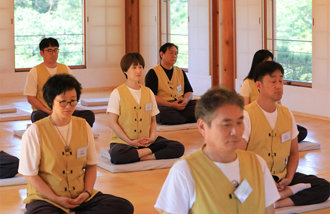"Losing Contact With Female Alumni Who Fail to Find Jobs"
"Losing Contact With Female Alumni Who Fail to Find Jobs"
Posted September. 12, 2004 22:01,
Entering College of Law at Seoul National University is a premium for a man that guarantees him a future until he dies, while the same is an obstacle for a woman in her life to overcome.
This is what a trainee at the Judicial Research and Training Institute and graduate of that University, identified as Chung (34), said in 1995 when she passed the judicial examination with a top score.
Now that seven years have passed, how much has her opinion changed?
Chung, currently a judge on a local court, assured us that there is no gender discrimination in prosecution and courts. Yet, she mentioned, More than half of unemployed lawyers are women. This implies that there is hostile sexism, for example, when a woman tries to enter a law firm.
Kwon Jung-ha, 30, who entered the Seoul National University Economics Department in 1995, gave a birth to her first child a few days ago. She is now on maternity leave. She entered S Credit Guarantee Fund after finishing her graduate course at the same university.
Nonetheless, Chung and Kwon, who succeeded in getting jobs, were exceptions. Most female students from the university were not reachable even after a month-long pursuit. It is assumed that they stopped contacting their alumni because they failed to get a job. Although they got a job, they still avoided contact if it was a temporary or not regular position.
Kang (33), who participated in preparing this report, analyzed, Female students who entered the university during that period are now in their early thirties and most of them will be having children now. They will be unwilling to expose themselves when they dont consider their lives as successful lives. She herself is now working as an instructor at a private English school for kids after failing several employment examinations for press/media companies.
Han Seol-hyei, 37, who used to work as an instructor at the Yonsei Severance Hospital, is now working as a doctor at the Seoul Songpa-gu Health Center. She says, The biggest obstacle for womens employment is childcare. Childcare gives disadvantage to women in reviews to be appointed as a professor.
In fact, the womens share among doctoral degree receivers in 2001 was 22.9 percent. However, female professors number only 14.1 percent. In public universities, it is even worse as there, female professors are only 8.8 percent of the total number..
Many female students, when they fail to get a job, go to graduate schools or, if financially capable, go abroad to study.
There are two female students in our graduate school. They seem to struggle between study and house chores, said Kim, identified by her first name, who was in her first year of graduate study at the Computer Science Department of Seoul National University. She also left to study at Maryland University in 2002.
Yang Dong-seop, 29, an alumna, with female students identified by their first names, L, N, and Y, who entered the Jeonnam University Computer Science Department in 1996, said, There were eight female students among us when we graduated from the school. We dont know what they are doing now since they are not coming to reunions.
Poet Moon Jeong-hee is singing in her poem asking, Where have all the female students gone.
Girls, who were excellent in their courses
As well as in extra curriculum,
Pushed away every where just like a fish out of water
Will they be still wandering without becoming mature?
Are they unable to become a part of this big and broad world
Confined in the kitchen and inner chamber of their house?
Where have all the female students have gone?
Jin-Kyeong Kim kjk9@donga.com







